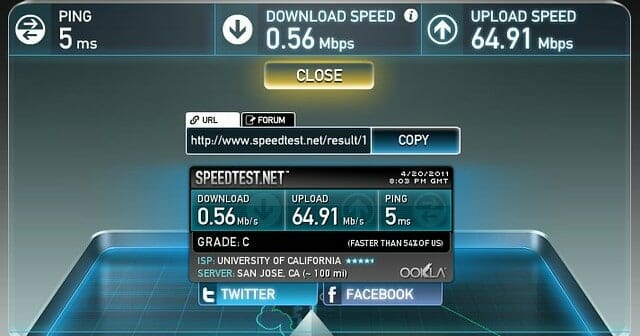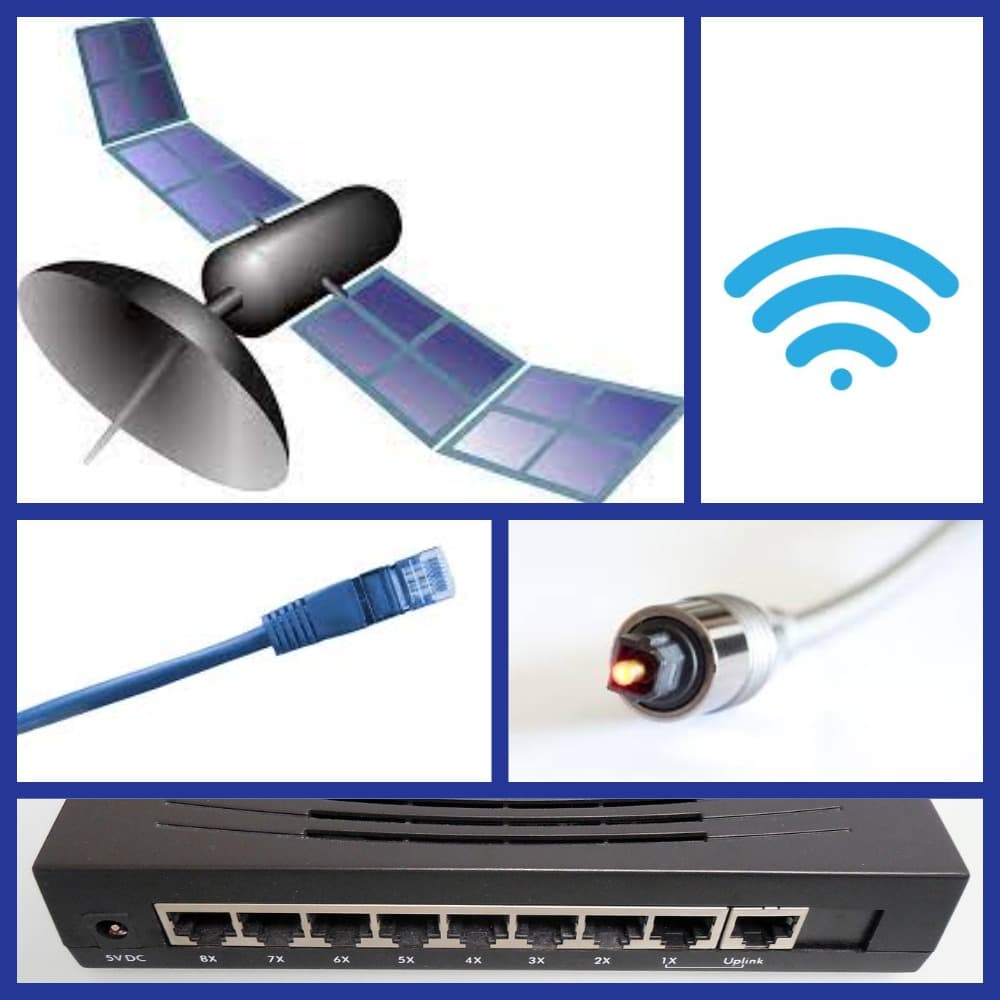Table of Contents
A good internet speed depends on what you need it for, so if you're planning to join eSports or begin your journey as a game, your first questions should be: "What is a good upload speed for gaming?"
The US Federal Communications Commission (FCC) considers 12 to 25 Mbps to be good internet speed for most families with multiple internet users and devices, but we disagree. The truth is, it really depends on how many people are in the household and what they are using the internet for and "good" is relative. In fact, many people only consider an internet speed "fast" when it is around 100 Mbps.To make sure if that's really true follow this link and read this post on double that speed, to boot.
What is the Good Internet Speed for Gaming, Work, Streaming, and other Activities?
The fastest internet speed today is 2,000 Mbps (or 2Gbps), which is offered by Xfinity. Just for comparison, these are the recommended internet speed for most activities:
The guide below focuses on a gamers' need for the best internet connection suitable for gaming.
Best Internet Speed: Upload vs. Download Speeds
Internet speed is measured by how much data your internet connection could transfer per second.
Data here refers to images, video, text, files, audio, and other content. The data goes in two directions - upload (data going out) and download (data going in).

What is Upload Speed?
Upload speeds (measured in megabits per second or Mbps) refers to how quickly information from your network is sent to external networks. It defines the time it takes you to send data to others.
Uploading occurs whenever you attach and send big files on e-mail, or while video-chatting your friends. So if your job requires sending out large files on a daily basis, finding high-speed internet with good upload speeds is necessary - read this review on how to improve upload speed.
What is a Good Upload Speed?
A good upload speed starts at around 5 MB/s for a single individual for most users and you can add .5 MB/s for each additional person in the household. However, if you're streaming, gaming, or uploading large amounts of data, starting at 10 MB/s and adding 1-2 MB/s for each additional person in the household.
In online gaming, you are continually sending information from your PC (or other gaming devices) to the server as you play. Having an internet connection that could support this amount of outgoing data is necessary for most online games. Most gaming companies require only 0.5 Mbps to 1 Mbps.
Why do we recommend adding 1-2 MB/s per person then? Because while that's about what you need the internet is rarely ever 100% stable. Adding additional upload speed gives you some safety in case the internet slows down. As gamers, we know how frustrating it is when you lag. Many a death has been caused by lag on Fortnite and League of Legends.
What is Download Speed?
Download speed, which is also measured in megabits per second or Mbps, refers to how quickly your router (internet connection) receives information from external sources. In most cases, download speeds is used more heavily and is the cause why people believe their internet is either fast or slow. Gaming online & other activities like streaming video on Netflix, listening to music on Spotify, and playing games all require good download speeds.
What is a Good Download Speed?
Recommended download speeds for most uses are around 25 Mbps.
The FCC recommends at least 25Mbps, but you might need to upgrade depending on the number of internet users, the number of devices connected, and activities being done online by all those who are connected to the same internet service. Moreover, you can increase the speed using these quality options for gaming purposes, or these recommended picks for general usage.
When it comes to online gaming, most video game console manufacturers recommend at least 3 to 6 Mbps of download speeds for smooth gameplay.
Latency, Ping Rate, and Data Caps
If you plan to do games online, latency, ping, and data caps are other considerations aside from the download and upload speeds.
- Latency (or lag) is the delay in sending or receiving information. Latency is affected by internet service speed, router performance/quality, or distance information has to travel.
- Ping is the measure of latency (measured in milliseconds) for how long it would take information to be sent from your system to game servers, and then make it back.
- A quick speed test online could give you your latency/ping details. The result could help you determine if your connection's high latency or ping rate is affecting your games.
- For gaming, your goal is to have low latency (around 20ms to 40ms), since high latency (150 ms or above) could negatively affect your online gaming experience.
- Sometimes, just moving your router from one spot to the next could help with the lag or latency issues. If you've transferred the router already and the speed isn't improving, then you could try buying a new router. If that still doesn't work, then you might have to switch to another internet plan.
Aside from the ping rate, make sure to check the data caps of a plan. Most internet service providers have a 1TB-cap, which is enough for most users. But if you're streaming an HD/4K video, or playing fast-paced games that eat up bandwidth, that 1TB of data will be gone so quickly.
Speeds for Gaming FAQs: What Speed Do I Need?
Now that you know the recommended upload and download speeds, let's know focus on the internet speed for gaming. How much internet speed do you really need?
Is 7 Mbps Upload Speeds Good for Gaming?
Casual gaming with minimal reaction time only requires 3 to 6Mbps. Competitive gaming would require fast internet (with a minimum speed of at least 25 Mbps).
Let's take a look at it this by comparing gaming systems:
- A computer requires a maximum ping rate of 100ms, minimum requirements of 3 to 6 MBps download speeds, minimum 2 Mbps upload speeds and a total minimum speed of 40 to 60 for a typical household
- Xbox, Playstation 4, and Nintendo Switch require a maximum ping rate of 150ms, minimum 3 MBps download speed, a minimum upload speed of 1Mbps, and a total minimum speed of 40Mbps for a typical household. Does that answer your 'Do you need internet for Nintendo Switch?' question?
- Is 10 Mbps Good Enough for Multiplayer Gaming?
Like 7Mbps, a connection with speeds of 10Mbps will be sufficient for most games, but if you're starting to take part in a game competitively, or you'll be participating in a multiplayer game regularly, you might have to upgrade your internet.
As a general rule, take the number of players and multiply it by the internet speed requirement of the game. If you have 6 people playing and the game requires your connection to be at least 2Mbps, (6 x 2 = 12Mbps), so the answer to your question is No (10Mbps is not enough for this scenario).
Obviously, the more players use the same connection, the more bandwidth you'd need to avoid lag. There is no quick-fix here. You just have to find a better internet speed for gaming with multiple players.
Choosing the Type of Connection Suitable for Gaming
The type of internet connection and providers - here's the review of our top picks - are also important factors in ensuring internet speeds are suitable for gaming.
For example:
- Fibr Optic (available at Google Fiber Optic, Verizon, AT&T) offers 50Mbps to 2Gbps download rates with 11–14 ms latency.
- Satellite Internet (available at Viasat, HughesNet, etc.) offers 12 to 100Mbps download rates with 594–624 ms ping.
- Cable internet (available at Xfinity, Cox, Spectrum, etc.) offers 15Mbps to 1Gbps download rates with 15–35ms ping speed.
- DSL internet (available at CenturyLink, Frontier, Verizon, etc.) offers 1Mbps to 100Mbps download rates with 25–43ms ping.
- Wi-Fi, 4G/5G (available at providers like Verizon, T-Mobile, AT&T, etc.) can accommodate 4Mbps to 1Gbps download rates, but it is generally not recommended to use Wi-Fi for gaming due to its unstable nature. Wired internet connections (those that are installed with ethernet cable) are more ideal, but if you do use the Wi-Fi, check out the best wireless extenders out there.

When comparing internet services, the information above could really help you choose the plan with the best bandwidth, latent speed, and overall service.
A Note on Livestreaming
If you're a gamer who live-streams on YouTube, Twitch, and other similar products and services, understand that your internet requirements would be a bit more demanding.
Streaming videos requires a low-latency connection with a consistently steady upload speed.

Wrap Up
One's internet connection can really be a huge factor when you do a game requiring connectivity to upload and downloading games and data. The bandwidth demand of eSports isn't as light as when you stream a video on Netflix and YouTube, or when you send e-mails to your boss.
Lag or delays in a game can even lead to a loss when you're competing on eSports. If you want to become a professional gamer and train at home, choose the best plan that fits your gaming system, upload/download speeds, ping rate, data cap, and whether you are playing a multiplayer game.
FAQs
1. What is a good Mbps for gaming?
In order to provide an adequate gaming experience, it is important to have a high Mbps connection. A good Mbps for gaming is typically around 50 mbps or more. This will ensure that your game has low latency and minimal lag. However, if you are only playing casual games or less graphics-intensive games, you may be able to get away with a lower Mbps.
2. Do upload speeds matter for gaming?
Yes, upload speeds do matter for gaming. A game's graphical fidelity is determined by the amount of data that can be sent to a player's computer in a second. If the connection between your console and internet service provider (ISP) is slow, it will take longer for your ISP to send this information to you so it will lower the quality of graphics on screen.
So if you want better graphics while playing games online then make sure your internet connection has fast upload speeds.
3. Does higher upload speed reduce ping?
Yes. With a faster connection, you can transmit and receive data more quickly, minimizing your ping. On the other hand, a slower connection speed can result in a high ping, making delays more evident when playing online.
4. Whats a good upload speed?
Upload speed is important when it comes to using the internet. You want to be sure that you have an upload speed of at least 5 mbps or higher to ensure a good experience. If you have a slower upload speed, you may find that some things are slow to load or even time out.
5. How can I speed up my upload speed?
- Use a wired connection if possible.
- Delete any temporary files you may have.
- Other devices should be removed from your network.
- Malware must be removed.
- Change the DNS settings on your computer.
- Drivers for devices should be updated.
- Upload at off-peak hours.


